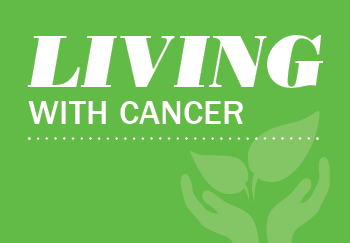 Vision changes and side effects during cancer treatment often don’t get the attention they deserve. For example, the National Cancer Institute (NCI) only lists eye changes under “other side effects” in its “Chemotherapy and You” patient handbook. With that in mind, can chemotherapy cause vision problems? While eye issues may not be as common a side effect as nausea, hair loss, or taste bud changes, cancer treatment can cause both temporary and permanent changes to your vision. With a little foresight, you can make safeguarding your eye health a priority.
Vision changes and side effects during cancer treatment often don’t get the attention they deserve. For example, the National Cancer Institute (NCI) only lists eye changes under “other side effects” in its “Chemotherapy and You” patient handbook. With that in mind, can chemotherapy cause vision problems? While eye issues may not be as common a side effect as nausea, hair loss, or taste bud changes, cancer treatment can cause both temporary and permanent changes to your vision. With a little foresight, you can make safeguarding your eye health a priority.
Can Chemotherapy Cause Vision Problems?
Chemotherapy drugs, as well as hormonal and targeted therapies, can indeed cause eye and vision problems. Steroids and other drugs used to manage other treatment side effects can also affect your eyes.
Depending on your cancer treatment, you can experience a variety of eye issues, known as ocular or neuro-ophthalmic side effects. The most common ocular side effects include clogged tear ducts; blurry vision; dry, red, itchy or watery eyes; conjunctivitis (or pink eye); eye pain; and general discomfort.
In rare cases, ocular side effects can be severe, disabling and irreversible. This includes optic neuropathy, an inflammation of the optic nerve that transmits vision information from your eyes to your brain. UpToDate listed the most recent research on how certain cancer drugs affect eye health.
Before You Begin Treatment
Each cancer treatment works differently, so each can affect eye health differently. Ask your cancer care team how your cancer treatment can impact your eyes and what’s considered out of the ordinary or cause for concern.
Your cancer doctor can provide you with a list of known side effects for each cancer drug you take. You can also find the common side effects on NCI’s A to Z List of Cancer Drugs.
Before you begin treatment, see an ophthalmologist or eye doctor to get a baseline measure of your eye health. If you already have underlying ocular issues, such as chronic dry eye, they can prescribe appropriate eye drops or other medication. Other medical conditions you have or other medications you take for those conditions may also affect eye health. Your eye doctor can review those conditions and medications with you to reduce the overall risk to your eye health.
Ocular changes during chemotherapy can also make it painful for you to wear contact lenses. Check with your cancer doctor or eye doctor about whether it’s okay for you to wear contact lenses during chemotherapy. You might want to switch to eye glasses during treatment to reduce eye discomfort caused by chemo. Be aware that your vision may change enough from cancer treatment that you may need a new pair of eyeglasses during or after treatment.
During Treatment
Always tell your cancer doctor right away about any unusual vision changes, especially if you are having trouble seeing or experiencing vision loss or pain. These can be a sign of a serious medical condition.
Your doctor may order additional tests to determine whether the visual problems are the result of drug toxicity or a sign that your cancer has spread. If the ocular side effects are related to the cancer treatment, your doctor might prescribe additional supportive therapy such as steroids, or discontinue the treatment in favor of a different cancer drug to preserve your vision.
To manage bothersome side effects, such as dry eye, your cancer doctor can recommend or prescribe appropriate eye drops or artificial tears to use during treatment. They may also suggest you see an ophthalmologist during treatment to help preserve your eye health.
Cancer treatment can also make your eyes sensitive to light or make it more difficult for you to see at night. If you experience these side effects, it may affect your ability to drive yourself to and from late appointments. Ask family and friends to drive you, or schedule your treatment appointments earlier in the day, when it’s easier on your eyes.
After Treatment
Some ocular side effects of cancer treatment can occur long after treatment ends. In otherwise healthy people, cataracts, a clouding of the eye lens, develop with elderly age. Cataracts can cause blurry or double vision, sensitivity to bright lights, and difficulty seeing at night.
Chemotherapy, hormone therapy, immunotherapy and steroids given as part of treatment can also increase the risk of cataracts, according to NCI. Late ocular side effects of cancer treatment also include dry eye syndrome, a condition where your eyes don’t produce enough tears. This can cause your eyes to feel scratchy or like you have something stuck in them.
Talk to your doctor about how you can protect your eye health during cancer treatment.
Unlike hair loss or taste bud changes which usually rebound on their own, some eye problems may require professional help. Once treatment is over, see your eye doctor to address any vision changes and evaluate whether you need to have any cataracts removed. Preserving your eye health should be part of your overall treatment plan.


When you end up with breast cancer it’s scary, so you immediately go to cancer Dr. With your mine set u don’t know side effects of chemo. The after sides effects are never told from cancer Dr
So yes your cancer is gone not it’s in remission. Now your left with one dry eye n no concrete answer. I was so healthy at those moments, life was good,down hill ever since
I not only have dry eye now macular pucker in right eye. Told maybe vision would come back 1 to 2 yrs. In my 2nd yr. an end is 10/19/23. Lucy me not going to get 20 20 vision back. Was a perfectly healthy person until after Chemotherapy.